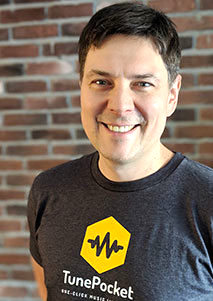|
HOME STUDIO Music Licensing: How To Add Music To Your Voice Over Project - Without Liability  By Mik Seliverstov By Mik SeliverstovMusician & Tune Pocket Founder & Managing Director
When used in moderation, music can add
tremendous value to your voice over demo or client project.
And with so much music around us, one might
think that finding the music you can use is easy.
Here are some basic facts, though, to help you
navigate the often confusing waters of music licensing. LIKE THAT SONG! It's very tempting just to grab a popular
tune and plug it into your project. Sadly, the copyright laws do not allow us
to use others' intellectual property as we please.
As a rule of thumb, you must obtain the
permission from the copyright owner to use any copyrighted material, even for
non-commercial projects.
Here are few typical mistakes that can land
you (or your client!) in hot legal water:
WHY CARE ABOUT LICENSING?
If you're running a business or doing
freelance work for clients, my suggestion is never to use unlicensed music.
The common risks include:
PROPER USE OF MUSIC
Using music in a commercial project
legally does not always meant you have to pay a high licensing fee. You can
even start for free. Here are some options: Public Domain Music That covers music with expired copyright.
Note that copyright laws do vary from country to country, as well as the copyright
expiration time. Furthermore, often when a composition is
indeed in public domain, the RECORDING of that composition is still be
copyrighted. Creative Commons Music Many indie musicians distribute their
music for free under the Creative Commons
license. Generally, that means that you can use
their music free of charge if you agree to certain conditions. There are
different types of creative commons licenses, so pay attention to the details.
The two typical limitations include the
requirement to credit the musician, and not using music in commercial projects. Permission Process for Famous Song What if you want to use a famous song?
It's not impossible, but will require some
work and adequate budget. When it comes to commercial music, the
rights are typically split between the record label and the publisher.
The publisher controls the composition
(that is, the words and the melody), while the record label controls the actual
recording of that composition.
You will need to obtain the license from
both the label and the publisher. PERFORMANCE LICENSE, TOO If your client plans to broadcast the
resulting recording (for example, on radio) you also need to know about the
performance license.
Most artists are members of performance
rights organizations (PRO) in their countries. The PRO collects the performance
royalties when music is performed in public places or transmitted to the public
over the radio or television broadcasts, and in some cases by the Internet.
Most broadcasters like TV and radio
stations already have the necessary performance licenses that cover all
applicable music, but this will be your responsibility to verify that if want to
use PRO affiliated music. As you can see, unless you're working for
a high profile client who demands a well known soundtrack, getting a license
from prominent artists isn't the most practical option for small business
owners and freelancers.
EASY ALTERNATIVE: MUSIC LIBRARY Is there an easier alternative? For most freelancers, the easiest option is
to purchase licenses from a production music library. The libraries typically source the music
from independent producers and offer affordable licenses for commercial and
small business use.
There are literally hundreds of large and
small music libraries and marketplaces offering affordable royalty free music for small
business owners and freelancers. Most libraries will let you choose
between a variety of royalty free
music licenses, but it will be your responsibility to read and understand
the differences between different licenses offered by each library. Always pay attention to the fine print.
Some libraries may require you to purchase a new license for every new project,
while others may have more generous terms or offer unlimited subscriptions. And it's always a good idea to make sure you
will get an official licensing certificate with your purchase. Hope this helps. And good luck finding the
perfect soundtrack for your next project!
----------------- ABOUT MIK
Mik Seliverstov is an independent musician and
the founder of TunePocket - a global collective of independent music producers that is one of the most affordable music licensing platforms,
offering thousands of music tracks, loops, and sound effects for commercial and
freelance use.
Users choose between an unlimited subscription or download just a couple soundtracks for a small project and save over 50%
compared to most popular music licensing outlets.
VoiceOverXtra readers can save an additional
10% with promo code VOXTRA10. Web: www.tunepocket.com LinkedIn: www.linkedin.com/in/miks |
As of the NEW website launch, 03/22/2012









.png)
(Love your logo)